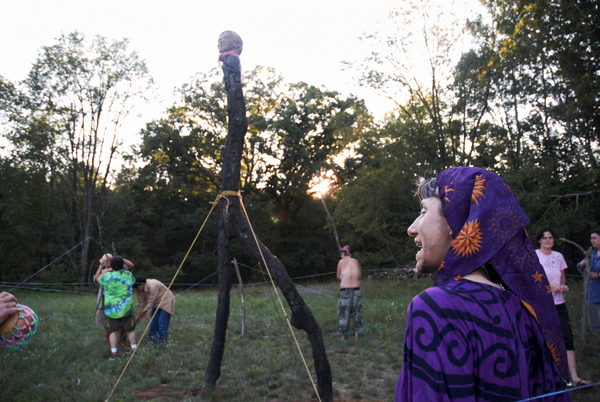Angela Jimenez is visual storyteller based in New York City and Minneapolis, Minnesota. CutBank asked her to select work for "All Accounts and Mixture" from two photography projects: Welcome Home and Same-Sex Ballroom. She was also kind enough to answer a couple questions. Notes on the images follow the interview. Enjoy!
***
***
CutBank: These two series are stunning. Can you say a little about how “Welcome Home,” and “Same-Sex Ballroom” each came about?
Angela Jimenez: Thank you. I started both these projects while working as a photographer/editor with VelvetparkMagazine, which my friend Grace Moon founded in Brooklyn. It is still online velvetparkmedia.com and the print version no longer exists. I was working as a newspaper intern, then professional freelancer, in New York City and Velvetpark was this amazing outlet where I could cover queer culture/subculture. I really credit Grace, and Velvetpark, for creating a space that valued this work that was too out there for mainstream newspapers.
Years later the New York Times published both these projects in some form. Things have come a long way.
Welcome Home: Building the Michigan Womyn's Music Festival started with me and Grace going to the Festival to do an article for the magazine. It took me awhile to understand how special it was, and how to approach it, and how to get access. But it turned into a book project that I did over the course of the next 6 years or so. It is a visual poem about the worker community that builds the Festival every summer. I self-published the book in 2009. The first edition is just about sold out.
“Same-Sex Ballroom” started with another Grace Moon road trip, this time out to Chicago where we were photographing athletes at the Gay Games in 2006. I had first seen this in Australia, because I went and competed in the Gay Games with my soccer team from Brooklyn and we saw there was gay ballroom dancing. I mean, how cool. So, I was curious.
CB: Can you discuss what “home” meant to you in the first project?
AJ: The title "Welcome Home" is not something I made up. It is something that the womyn at the Festival say to each other when they first greet each other on the Land of the Festival as they arrive each year. I found a home there too, a very beautiful and complicated community that is full of herstory. And that is what the book is about.
CB: In “Same-Sex Ballroom,” where did you travel to capture images? What captivated/surprised you most about the project?
AJ: That summer in Chicago, I decided to set up lights and shoot the same-sex ballroom the way I learned to shoot high school basketball games when I was interning at the Newark Star-Ledger in New Jersey. Which I find hilarious in retrospect. But, I felt really clear about it. I started shooting and I thought it was really breathtaking. The pageantry is sort of funny, but people are serious about it, and I respect that. They are doing something totally subversive. It is also really visually rich- there is emphasis on the sameness of the couples in the costumes and the dancers more fluidly change and switch gender roles. Dance, in all cultures, is such a powerful metaphor for gender roles and relationships. I was tired, I think, of the way gay relationships were visually depicted. Where was the fun? The passion? The character? This had it. And I found this pamphlet for the next world championships to be held in Budapest. I was like Budapest? Wow. That was the beginning of an obsession. I followed this subculture from Chicago to Budapest to New York to Antwerp...eventually I had to stop. I shot it through like 2010 and it has been on the shelf for awhile. You never know, I might go back to it...I am still in touch with some of these wonderful dancers.
CB:What are your goals for yourself as an artist? What do you hope viewers of your photographs take away?
AJ: I really want to communicate something about the lives of my subjects that makes a viewer connect with that subject. I come from that school of thought (I studied photojournalism at the University of Missouri-Columbia) that all the small moments of people's lives have value and that you can change the world by telling stories so people understand each other better. I really do believe in that. I feel really overwhelmed and powerless about all that is wrong sometimes. Visual stories is what I have found as a way to put something out there, to contribute to change and evolution in some small way. I am really drawn to stories that can crack open some rusty, old door of thinking in someone's mind. Because that is what photographing them does for me.
CB: You designate yourself as a “visual storyteller.” Can you say a bit more about that?
AJ: I use photos and video and sound to tell stories, stories that you see. I work a lot as a photojournalist, but I am not always working in traditional journalism. So, storyteller is the title I am most comfortable with. I also write songs (which I am sort of closeted about) as a hobby and I think folk musicians and other storytellers are amazing. I am trying to associate myself with that tradition.
***
Image Notes
Welcome Home
All Photos: From the book project Welcome Home: Building the Michigan Womyn's Music Festival, self-published First-Edition 2009. All Photos by Angela Jimenez. Copyright 2009 Angela Jimenez Photography.
Same-Sex Ballroom
1. Same-sex ballroom dancers Lee Sharmat, rear, and Melinda Kay, foreground, compete in the women's standard dance at the 5 Boro Dance Challenge on May 5, 2007...The locally produced 5 Boro Dance Challenge, New York City's first major same-sex dance competition, was held at the Park Central Hotel in Manhattan from May 4-6, 2007.
2. Choregrapher and professional opposite sex dancer Tony Scheppler leads a same-sex Viennese Waltz segment Dance Times Square in Manhattan, during a rehearsal of "A Show Unlike Anything on Broadway!" on March 18, 2007. The show was the entertainment portion of 5 Boro Challenge event.
3. Defending World Champion same-sex ballroom dancers Robert Tristan Szelei, left, and Gergely Darabos, talk to Hungarian television journalists in their dressing room at the Korcsarnok arena in Budapest, Hungary, after a disappointing round in the Latin category during the 2nd annual World Championship Same-Sex Ballroom Dancing competition on October 21, 2006...Darabos was overcome with a leg cramp while trying to defend their title in the Latin event and the couple dropped into fourth place. The pair, however, went on to win the mens Standard division...Darabos and Szelei, known as the "Black Swans," have been training and preparing to host the 2nd annual World Championship and the Csardas Cup, the first-ever Eastern European same-sex ballroom competition. This is the pinnacle event of the blossoming same-sex ballroom scene...The event was organized by the US-based World Federation of Same-Sex Dancing, which hosted the first World Championship Same-Sex championships in 2005 in Sacramento, California. The Black Swans did a large amount of the coordination and planning in Budapest, a city that had never seen an event of this kind. When government funding fell through, they secured funding from patron Desire (accent on the “e”) Dubounet, owner of the local Club Bohemian Alibi drag club...The World Championship events are newly recognized, but same-sex dancers have been competing on a national and international circuit for a number of years, especially in Europe, including at the Eurogames, the Gay Games, the London Pink Jukebox Trophy and the Berlin Open, among others. Countries including the United States, the Netherlands, Germany and, now, Hungary, hold their own national same-sex championships. Hungary held its first national championships in April 2006...Szelei and Darabos spent three months at the Sacramento Dancesport same-sex dance school in California this summer, on the first scholarship offered by the World Federation.
4. Gay ballroom dancers Bradley Stauffer, left, and Soren (umlaut on the "o") Kruse, both of London, England, clap for the female dancers during the Dancesport (ballroom dancing) competition at the Hilton Hotel and Towers in downtown Chicago during Gay Games VII on July 19, 2006… Over 12,000 gay and lesbian athletes from 60 countries are in Chicago competing in 30 sports during the Games from July 15 through 22, 2006...Over 50,000 athletes have competed in the quadrennial Games since they were founded by Dr. Tom Wadell, a 1968 Olympic decathlete, and a group of friends in San Francisco in 1982, with the goal of using athletics to promote community building and social change...The Gay Games resemble the Olympics in structure, but the spirit is one of inclusion, rather than exclusivity. There are no qualifying events or minimum or maximum requirements...The Games have been held in Vancouver (1990), New York (1994), Amsterdam (1998), and Sydney (2002).
5. Lesbian ballroom dancers Petra Zimmermann, center left, and Caroline Privou, right, both of Cologne, Germany, compete during the Dancesport competition at the Hilton Hotel and Towers in downtown Chicago during Gay Games VII on July 20, 2006...The couple won the gold medal in the standard A division for women.
---------------------------------
A long-time regular contributor to The New York Times and a contract photographer with the Getty Images creative department, Angela Jimenez works on assignment and develops & produces short & long-term documentary projects. Her work has been honored by the Magenta Foundation as a Flash Forward Emerging Photographer in 2010, New York Press Photographer's Association, Review Santa Fe and the Communication Arts Photo Annual, supported by grants from The Alexia Foundation student award and The Puffin Foundation, and acquired into the permanent collection of the Leslie Lohman Museum for Gay & Lesbian Art.
Cover Photo by Angela's wife, Ashley Harness











